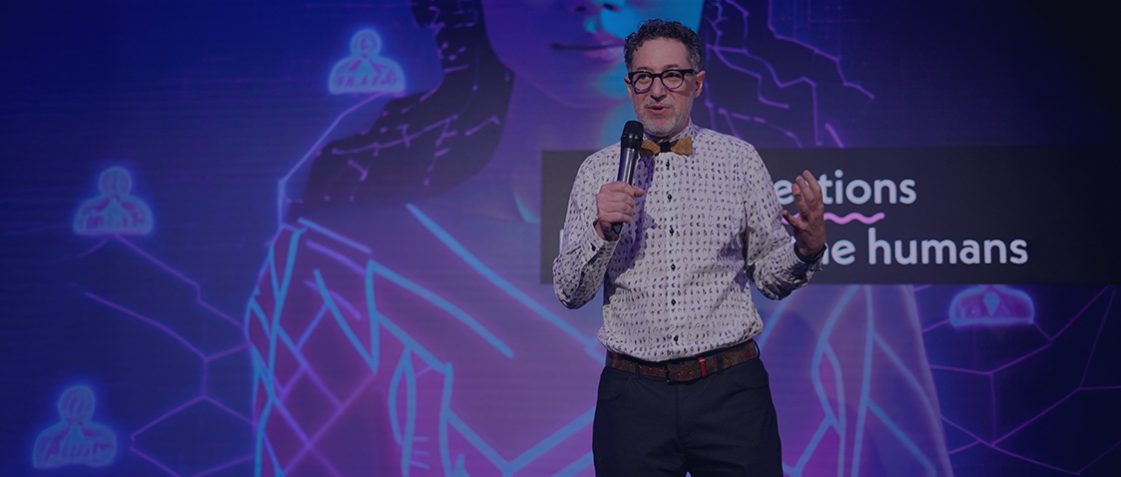
Microcredentials are just the beginning. Noah Geisel on people, community and the future of education
“How you tell your story changes everything. Even your flaws can become strengths if you present them in a different light,” said Noah Geisel in June during the Warsaw Microcredentials Summit, organised by the Educational Research Institute – National Research Institute. Wearing his characteristic bow tie, he arrived with a smile that instantly broke the ice. His honest demeanour encouraged an open dialogue about the future of education.
Noah Geisel is a well-known expert in the field of education in the US. He is the driving force behind the Badge Summit @ CU Boulder, a conference he envisioned and developed from the ground up, intending to advance beyond theory and foster conversations based on concrete, real-world situations. He created a space where educational innovation meets real application, and where technology serves as a means of confirming and valuing genuine abilities.
Noah works as Micro-Credential Program Manager at the University of Colorado Boulder and helps students and professionals document what they are truly capable of.
“If microcredentials and badges have a stage, then Noah Geisel is the one who ensures the spotlight shines on people and their skills,” his friends say about him.
Thanks to Noah, this year’s Badge Summit at CU Boulder featured a presentation by Martyna Leciejewicz and Michał Nowakowski from the Educational Research Institute – National Research Institute. Experts from IBE presented the Polish approach to microcredentials. We spoke with Noah during the summit.
Microcredentials Polska: Looking back at this year’s Badge Summit – how would you summarise the value brought by this inspiring community of experts and practitioners?
Noah Geisel: The keyword there is community. People don’t just attend Badge Summit; they become part of a participatory community that embodies connected learning principles: interest-driven, academically oriented, openly networked, peer-supported, production-centred, and shared purpose. This shifts our presenters from broadcasters to collaborators, and empowers passive attendees to become risk-takers and producers. This is truly inspiring to witness and an honour to lead. And it has nothing to do with microcredentials, honestly. It’s all about humans believing that we can change the world and then actually taking the space to start doing it.
MP: In what direction are microcredentials heading? What key changes or trends do you observe in this area?
NG: I think what we saw this year was a clear indication that the direction of microcredentials is moving from promising potential to actually realising that potential. For most people, the totality of microcredentials has begun with creating credentialing programs and issuing credentials for those programs. What’s interesting is that, for the first time, zooming out to a broader ecosystem approach that recognises the importance of taking into account “What next?” after people earn a credential, is becoming widespread. This is an exciting trend. All of the attractive and shiny aspects of the technology, such as portable badges, digital wallets, etc., are only meaningful in a world in which it is vital that credential earners are operationalising their credentials. This has been a fringe point of view for several years, so it’s a significant trend to see it being more widely accepted.
MP: From your perspective, what can the USA learn from Europe or countries like Poland in the context of building national or regional microcredentials ecosystems?
NG: Two very important lessons come to mind. First is the cautionary tale that standardised frameworks are not a silver bullet solution. While national adoption is certainly a huge deal to some committees of respected experts, it does not automatically translate to national implementation that impacts and is appreciated by millions. Second, the best practice of refuse to work in silos. Poland, in particular, is an inspirational example of the scale that can be quickly achieved by collaborating across domains and disciplines, bringing together myriad stakeholders (industry, education, government, NGOs, etc.) to help them see that they are interconnected and even interdependent.
MP: Which achievements or practices from the USA, in your opinion, should be considered for implementation in Europe?
NG: In the USA, we have different policy conditions, like Local Control, that make things like nationalised standards difficult to achieve. A consequence of this can be a more permissive environment to be experimental and entrepreneurial. It seems like we have more safe space for allowing early-stage and highly imperfect work “into the wild,” as we say. This promotes more frequent and informative feedback loops, which, in turn, drive more iterative progress.
MP: If you were to summarise the current state of digital credentials in a few sentences, what would you say?
NG: In just over a decade, this stuff has gone from something only a few people on the planet had even heard of to something to which hundreds of millions of people directly connect. Be it through school, work, membership organisations, or platforms like Duolingo, Snapchat, Lyft, and fitness trackers, digital recognitions are becoming normal. And a huge turning point for the market is that expansion towards ubiquity will make consumers realise what they need from products and start demanding it. For vendors that have held off on developing key infrastructure due to a lack of ROI, that demand is the needed signal they’ve been waiting for. That signal will represent a nexus I predict will rapidly accelerate us toward the future that we’ve been dreaming of.
MP: Finally, what advice or message would you give to university students and graduates navigating the changing world of competencies, credentials, and work?
NG: This work is not just about you; it is for you. And, while you are reliant on other stakeholders to satisfy their responsibilities in this ecosystem, you too have responsibilities to earn your credentials, to be proud of your credentials, to know how to narrate and apply your credentials, and then to actually put them to use.
